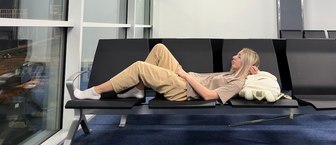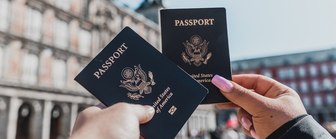The unwritten rules of air travel can be hard to track: how much conversation is acceptable with your seatmate? Will you make a sworn enemy by reclining your seat back? Will other passengers mind if you bring a hamburger aboard? According to data from YouGov, there is a lot of opportunity for flight faux pas because about one-third (36%) of Americans travel at least once a year.
Let’s start with the post-boarding basics: talking.
When seated next to a stranger on an airplane, the consensus is to “exchange pleasantries, but nothing more” (35%) or “converse with them a little bit” (32%). Just 15 percent of people prefer not to speak with their neighbors at all, while 5 percent prefer “a lot” of conversation or to chat the entire flight.
Common courtesies from the cabin
To start, don’t bring onion rings or burgers aboard: two-thirds (69%) of US adults say it is “somewhat unacceptable” or “very unacceptable” to bring pungent food onto the plane.
Another good rule is to put your shoes back on after going through the TSA line — and keep them on your feet. A majority (55%) of Americans say it is “somewhat unacceptable” or “very unacceptable” to take your shoes off while on a plane. Millennials are the most likely generation to find this behavior “completely acceptable” (14%), while Baby Boomers are the most likely to say it’s “completely unacceptable” (38%) to remove shoes.
Not every airplane behavior is frowned upon, though. Seven in 10 Americans (70%) say it is acceptable to recline your seat on a plane. Men are more likely than women to say it is “completely acceptable” (38% vs. 29%) to lean the airplane chair back. Additionally, Americans making more than $80,000 annually are more likely to say this is “completely acceptable” (41%) compared to individuals making less than $40,000 annually (30%).
Who’s in the “Mile High Club”
The so-called Mile High Club remains fairly exclusive in America. Just 6 percent of adults say they have had sex on a plane, according to the YouGov data. Men (9%) are more likely than women (2%) to say they've had sex on a plane. Men (5%) and women (3%) selected “prefer not to say” at a similar rate for the question.
Nearly one in ten (9%) parents of kids under 18 years old say they’ve had sex on a plane, compared to 5 percent of parents with kids over 18. Millennials are twice as likely (8%) as Generation X (4%) to say they have had sex on a plane. One in twenty (5%) Baby Boomers say that they have.
How Americans regard emotional support animals
In 2019, the Department of Transportation and various airlines tightened their regulations surrounding emotional support animals. The stricter rules were issued amid controversies around an emotional support peacock, an emotional support squirrel, and emotional support snakes.
Americans are not keen to see them in the skies either: a snake is the most "completely unacceptable" (66%) emotional support animal. It is closely followed by a peacock (64% say is “completely unacceptable”) and an emotional support squirrel (56% say it is “completely unacceptable”). The most acceptable emotional support animals, according to most Americans, are a dog (66%), cat (52%), and a hamster (31%).
See the full survey results here and sign up to be a part of the YouGov panel
Related: The worst thing to talk about during the holidays is not politics
Methodology: Total unweighted sample size was 1,219 US adults, which included 342 Millennials, 319 Gen Xers, and 412 Baby Boomers. The figures have been weighted and are representative of all US adults (ages 18+). Interviews were conducted online between November 7 - 8, 2019.
Image: Getty









